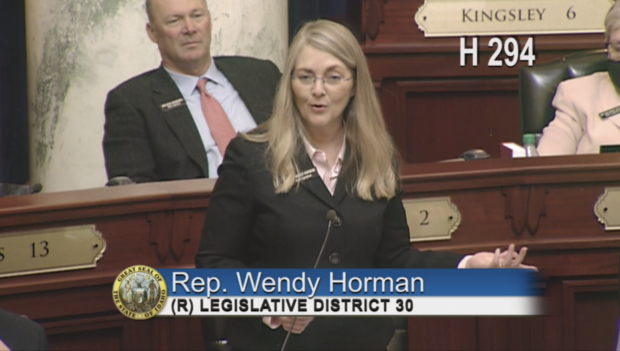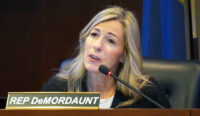The Idaho House of Representatives approved a bill Tuesday to relaunch a grant program that helps families fund educational expenses, and create a $5 million scholarship program for nonpublic school students.
Rep. Wendy Horman’s House Bill 294 would use $30 million in one-time federal funds and $5 million in ongoing state money to fund and administer student grants. The grants can go to public, private and homeschool students, are distributed according to income thresholds and capped at $500 per-student, per-year.

“Do you need tutoring? Do you need a computer? Do you need help paying your internet bill? Do you need speech therapy? Here’s $500 to help you with that if your school is not able to offer some of these courses,” Horman, R-Idaho Falls, said during floor debate.
Even legislators opposed to the bill spoke in favor of the grant program, essentially a revamp of the Strong Families, Strong Students program Gov. Brad Little created last year to help families pay for educational expenses during the pandemic.
The scholarships for nonpublic school students proved more controversial.
Horman’s bill would create a scholarship equal to 90 percent of Idaho’s average, per-student spending amount from the previous year, for students who previously attended public school but want to seek another option. The $5 million in state funding could fund around 800 student scholarships.
The issue of state scholarships for students who don’t attend public schools has gained prominence following a recent U.S. Supreme Court decision. Last summer, the high court ruled a Montana state scholarship program must be made available for students in private schools, including religious schools.
Critics equate the scholarships to vouchers for non-public schools. House Minority Leader Ilana Rubel, D-Boise, protested the idea of state scholarship money going to private schools that don’t have to adhere to the same accountability measures as Idaho’s public schools.
“If you want to send your kid to a private school that teaches who-knows-what, bless you, that’s your right,” Rubel said. “But when we’re cutting checks out of taxpayer dollars it has been a very time-honored principle that there is accountability that goes with that.”
The bill passed the House 47-22, with 10 Republicans and the House’s 12 Democrats opposed. It heads next to the Senate.
Vaccine exemption disclosure bill heads to House
A bill from Rep. Gayann DeMordaunt, R-Eagle, to require schools to disclose vaccine exemptions on parent handouts is headed to the House floor. 
The bill requires school districts to describe Idaho’s vaccine exemptions “in any communication to parents and guardians regarding immunization.” Idaho parents can opt students out of required school immunizations for health reasons, or because of religious or other objections. Idaho’s vaccine opt-out rates are among the highest in the nation.
Quinn Perry of the Idaho School Boards Association testified against the bill, as did House Democrats John McCrostie, D-Garden City, and Steve Berch, D-Boise.
“We fully believe this legislation could further relax the standard on this important issue and puts the remainder of our students and staff at an even greater risk for communicable diseases,” Perry said.
DeMordaunt contends that her bill simply makes sure parents are aware of the exemptions that already exist.
Amended charter school funding bill passes committee
A bill to provide $6.1 million in funding to virtual charter schools who saw an enrollment spike during the pandemic is back on track following Senate amendments.
House Bill 22 would temporarily bypass an obscure cap in annual funding increases for charter schools, to address dramatic growth at Idaho Virtual Academy and Inspire Connections Academy.
The bill passed quickly through the House in January, then hit a snag in the Senate, where legislators voiced concerns about potential unforeseen costs down the road if they removed the charter school funding cap entirely.
Senators wrote an amendment limiting the exemption to the 2020-21 school year and returned the bill to the House Education Committee, where it passed with only one no vote.
Galloway’s payment for parents bill advances to House floor
A contentious bill by freshman representative Codi Galloway, R-Boise, advanced out of House Education following lengthy debate.
Galloway’s House Bill 293 would allow parents to pull their students out of schools not offering full-time, in-person instruction by April 1. The bill would withhold state funding from the district, instead giving the money to the student’s parents to fund alternate educational expenses.
Galloway wants kids back in school full-time. She made the point that school closures have been detrimental for student achievement, contributed to student mental health concerns and posed outsized issues for low-income and single-parent households.
“Our kids have gone unheard for a year while schools have been shut down,” Galloway said. “Someone needs to stand up and speak for them.”
Idaho has largely enabled individual districts to decide whether and how students can return to in-person classes during the pandemic. Despite widespread closures last spring, most schools returned to some form of in-person instruction in the fall of 2020. By the end of March, 82 percent of the state’s students are expected to be in-person full-time, according to an Idaho Education News analysis.
The Idaho Association of School Administrators and ISBA testified against the bill, arguing it threatens local control and punishes school boards who have to balance health protocols with the benefits of in-person learning. They argue Idaho is already ahead of the national curve in school reopening.
“This bill tells our locally elected school board members that no matter what decision they make, if the Idaho Legislature doesn’t like it, they’re going to come in and make a different decision for you,” ISBA Executive Director Karen Echeverria said.
Public testimony on the bill was divided between parents in favor of the bill and administrators and patrons opposed to it. Rep. Gary Marshall, R-Idaho Falls, joined Democrats in opposition to the bill. It heads to the floor with a do-pass recommendation by vote of 11-4.
More Statehouse news: Guns-in-schools bill heads to House floor.
Idaho Education News covered Tuesday’s hearings remotely.
